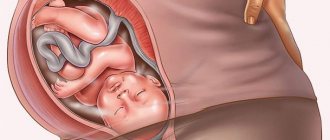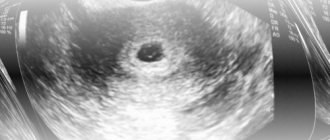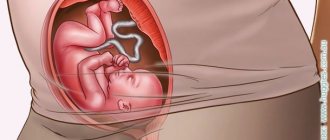Pregnancy is a wonderful time period for every woman who, sooner or later, dreams of becoming a mother. And its entire period is divided into three large trimesters.
12 weeks of pregnancy from conception is the final point of the first trimester. At this time, a pregnant woman begins to feel much better than at the very beginning of pregnancy, and is already aware of the fact that she will soon become a mother. And at this stage of pregnancy, the female body has passed the phase of the so-called “restructuring” and has completely adapted for further bearing a healthy child.
Fetal development at 12 weeks of pregnancy
The embryonic period of the child’s development ends, and the next one begins - the fetal period, which will last until childbirth. The future baby has turned from one cell into a tiny person measuring 53-61 mm.
Fruit size:
All its systems and organs are actively functioning, with the exception of the respiratory system. Sexual differentiation has come to an end, and at the next ultrasound, parents will be able to find out the gender and get a photo of the fetus.
| Fetal development parameters | Approximate indicators of the norm (at this time) |
| Height | ~ 53 – 61 mm |
| Weight | 9 – 13 g |
What does the fetus look like at 12 weeks
During an ultrasound, parents can already clearly see what their unborn child looks like.
Even without any decoding of the study and explanations from the uzist, you can easily distinguish the contours of the baby’s body.
- The baby's torso and tummy are slightly larger than his head, and the legs and arms are still short and still barely distinguishable.
- A doctor will be able to recognize the sex of a child only by using modern equipment and provided that the baby’s genitals are clearly visible.
- When examining a pregnant woman’s belly, a video of the baby can be recorded onto a medium already at this stage and saved for the family archive.
Note! to ask the question about the correct positioning of the baby in the uterine cavity. The fetus at week 12 literally moves and tumbles like a little acrobat, now upside down, now downwards. He can be in any position and change it at will. This happens for the reason that there is currently more than enough space in the uterus for all movements of the fetus.
What happens to the baby at this stage of pregnancy?
The following points can be noted in the development of the baby in the womb:
- The main organs and systems are formed by 12 weeks. Some of them perform their direct functions, for example, the heart beats and pumps blood. The remaining organs continue to improve, such as the intestines;
- light fluff appears at the location of future eyelashes and eyebrows;
- a unique pattern is formed on the baby’s tiny fingertips;
- the fetal facial expressions are actively developing: in a couple of weeks on an ultrasound you will be able to observe the baby’s funny grimaces;
- the membranes between the fingers finally disappear, small thin nail plates appear;
- the outer ears are still underdeveloped, but continue to mature and lobes are already forming on them;
- future regulators of immunity – leukocytes – are formed in the fetal blood;
- the first reflexes work: the fetus clenches/unclenches its fists, imitates breathing and swallowing movements;
- contraction of the intestinal muscles occurs;
- There is a daily and consistent strengthening of bone tissue in the fetal body.
Changes in the body of the expectant mother at 12 weeks
By the end of the 12th week, the state of health of a pregnant woman who suffered from toxicosis usually improves. Drowsiness and chronic fatigue caused by the action of progesterone are replaced by a good mood and a surge of energy.
| Parameters of a pregnant woman | Indicators for this period |
| Weight gain (from the beginning of pregnancy) | ~ 2 – 3.5 kg |
| Weight gain (per week) | ~ 400 g |
| Volume of amniotic fluid | 90 ml |
| Increase in fundal height of the uterus | 2 – 6 cm |
What does the belly look like at 12 weeks pregnant?
This week, the expectant mother can already feel how her tummy is gradually beginning to grow. During the first pregnancy, the belly begins to grow a little later than during repeated ones. At week 12, the waist is only slightly rounded, and the expectant mother feels quite comfortable; she can still wear regular everyday clothes.
Photos of bellies:
If the pregnancy is second and subsequent, the belly increases earlier, forcing the woman to look for more spacious clothes by the end of the first trimester.
Sometimes the growth of the abdomen is accompanied by mild itching. This may be the first “bell” of the formation of stretch marks, and their appearance is possible not only on the stomach - the chest and thighs are also susceptible to stretch marks. Also, by the 12th week of pregnancy, age spots and a dark stripe running from the navel down may appear. Obstetricians-gynecologists reassure: these are temporary phenomena and are not a cause for concern.
What happens in a woman’s body at this stage of pregnancy?
- the uterus no longer fits in the pelvic space and begins to occupy the abdominal cavity;
- toxicosis most often completely stops at this stage of pregnancy, very rarely it lasts up to 13-14 weeks;
- the emotional state is already more stable, but irritability, tearfulness and sensitivity may persist;
- feelings of drowsiness and fatigue disappear;
- it can be difficult to concentrate, the body spends a lot of energy maintaining the well-being of mother and baby;
- blood volume increases slightly;
- The breasts have grown noticeably and colostrum may begin to leak from the nipples.
12 weeks of pregnancy: what happens to the body, what sensations (mother’s experience - video):
What may worry the expectant mother at the end of the first trimester?
- swelling of the legs and arms;
- the hair becomes dry and brittle, the same problem occurs with the nail plates;
- the skin of the abdomen stretches;
- a little tugging in the stomach or lower back;
- food “fads” still persist, despite the end of toxicosis.
Miraculous Findings
It is wrong to compare pregnancy with a disease, and yet it is from the 12th week that the female body begins to gradually revive and return to normal.
Little by little the joys of life begin to return:
- if there was toxicosis, then it most likely went away (read how to deal with toxicosis here);
- debilitating drowsiness dissolved, and with it unbearable fatigue;
- the emotional state returns to normal and the panic horror of losing a child disappears;
- Little by little, you begin to want to go to the toilet less often (this, however, will soon pass - the uterus will enlarge so much that it will begin to put pressure on the bladder).
Behavior and perception of the world around us changes. I want to sit for a long time in an autumn park and admire the falling leaves or go out into nature to walk through the forest and pick mushrooms. There is no fear of an imminent birth yet, so a general state of peace and tranquility has a beneficial effect on emotions. Although tearfulness and irritability may persist.
Lifestyle of an expectant mother at 12 weeks
What you need to pay attention to and how to build a daily routine during this period.
Daily regime
If a woman’s well-being is at the same level, then she can lead her usual lifestyle. Of course, she should take care of a sufficient amount of sleep - at least 8 hours a day, three meals a day, sufficient movement during the day and the opportunity to go to bed on time to rest.
At 12 weeks of pregnancy, you should not abuse physical activity. Remember that your baby is just settling into his stomach and there is no need to disturb him again. And the woman has not yet studied the capabilities of her body, being in an interesting position - sudden dizziness during a habitual jog can play a cruel joke.
Now, in the third month of pregnancy, the expectant mother is laying the foundations for the health of her child - this is a very important job that no one except the mother herself can do.
Hygiene procedures
At this stage of pregnancy, there is still no confidence that bearing the child will proceed normally and without complications. Many doctors are of the opinion that taking a bath can cause infection from the water to enter the birth canal. Also, excessively hot water (above 38-39 degrees) increases blood pressure and can cause miscarriage. And although when a woman’s body is immersed in water, the water does not penetrate above the lower third of the vagina, at week 12 it is better to do without a bath, limiting yourself to a shower.
Spending time at the computer/TV
When working on a computer or watching TV during pregnancy, it is not the notorious “radiation” that is scary, but prolonged immobility. Every half hour or hour after sitting in one place, you need to take breaks, during which you can move or walk. Expectant mothers should beware of poor monitors that flicker and can cause eye strain. Also, choose comfortable chairs and armchairs for sedentary work - uncomfortable surfaces put too much stress on the spine, which is useless in an interesting position.
Intimate relationships
There is only one rule here - if the doctor observing your pregnancy finds no contraindications for intimate contacts, and the expectant mother is in good health, then you should not deprive yourself of the pleasure of spending time with your spouse. But if a pregnant woman has concerns (pain, nausea, weakness) or lacks desire, she will have to endure certain deprivations in this area. Remember that many families go through this ordeal, and changing hormonal levels are often to blame.
Contraindications to intimate relationships at 12 weeks are:
- increased uterine tone;
- low location of the placenta;
- difficult pregnancy;
- vaginal herpes;
- pregnancy with more than one fetus (carrying twins, triplets, etc.).
About sex and the man you love
Although those around you may not be aware of your situation, your beloved man has probably been aware of this for a long time. Some husbands are convinced that women do not need special treatment during pregnancy. They say that nature has provided for everything, and all these quirks are just whims, attempts to attract attention.
Heart-to-heart conversations will help you avoid growing apart from each other during pregnancy. Don’t hide your thoughts from your husband, tell him how you feel and what you’re thinking about, don’t hide your problems.
Is it possible to maintain normal sex
during pregnancy? Find out all the details in my post. I am convinced that it is possible, but a lot depends not only on the willingness of the spouses to hear each other, but also on your well-being and the progress of the pregnancy. Don’t go against your own feelings, and if on some day you don’t want intimacy, tell your loved one about it, but don’t forget to emphasize your love and affection, and show care.
And not only conversations and a special attitude, but also specific actions, for example, Kegel exercises will help improve your intimate life and give birth easier (more about them here).
Medical examinations at 3 months of pregnancy
This point is worth paying special attention to.
Doctor visits
At the 12th week of pregnancy, a woman is given a bypass sheet, which indicates the specialists whose consultation is necessary at this stage. Visits to the following doctors are required:
| Obstetrician-gynecologist | In the third month, the expectant mother visits this doctor’s office once a month. The specialist examines the pregnant woman, writes down the main measurements (current weight, pressure, height of the uterine fundus) into the chart. The main purpose of a visit to an obstetrician-gynecologist is to make sure that there are no threats to pregnancy. |
| Therapist | A consultation with a therapist is needed to rule out the mother having chronic diseases, such as heart disease or hypertension. If there are any, then the well-being of the expectant mother will be monitored more closely for the entire period of pregnancy in the antenatal clinic. |
| Oculist | This specialist evaluates the condition of the retina and fundus of the eye. The choice of labor management tactics depends on the results of the examination. In case of serious problems with the inner lining of the eye, doctors advise avoiding pushing, so in most such cases a cesarean section is prescribed. |
| Dentist | The “dentist” determines whether there are pockets of infection in the oral cavity (i.e. caries) and eliminates them as far as possible. It is very important not to delay treatment of problem teeth for a long period, since during pregnancy the process of destruction of enamel and the formation of carious cavities occurs at double speed. |
| ENT doctor | Eliminates the presence of chronic infections in the ear canals, nasal cavity and throat. Sometimes in the first or second trimesters, the expectant mother is attacked by “rhinitis of pregnancy,” which is characterized by nasal discharge, difficulty breathing and sinus congestion. At the same time, the general state of health does not deteriorate, and the body temperature is normal. Consultation with an otolaryngologist in this case will help to cope with the problem in a short time. |
Analyzes
At the end of the first trimester, a woman is prescribed a wide range of tests. Their results will allow the doctor to objectively assess the development of pregnancy. Tests at the 12th week of pregnancy will necessarily include:
- blood test for syphilis;
- blood test for HIV infection;
- analysis for antibodies to hepatitis B and C virus;
- analysis to determine blood group and Rh factor;
- clinical blood test;
- blood chemistry;
- a smear from the vagina and cervical canal for sexually transmitted infections;
- study of blood clotting factors;
- general urine analysis.
Prenatal screening and ultrasound
By the end of the first trimester, the expectant mother should not only register for pregnancy, but also undergo the first screening at 12 weeks of pregnancy for fetal malformations. It includes an ultrasound of the fetus and a blood test for the hormones human chorionic gonadotropin (hCG) and plasma protein (PAPP). A change in the level of their content is a marker of the presence of certain abnormalities in the child.
Ultrasound prenatal screening at 12 weeks (video):
The gender of the baby is not yet visible on an ultrasound at 12 weeks. But in the photo that will be provided to the parents, it is already clearly visible that the fetus looks like a miniature man - you can see the head, tiny arms and legs.
On a note! Go through all the tests that your obstetrician-gynecologist prescribes for you. This is not only a precautionary measure - without the necessary examinations, a woman risks ending up in the infectious diseases department of the maternity hospital. Remember that with the results of your tests in hand, it is easier for the doctor to draw up a rough plan for managing your pregnancy.
Recommendations
The following tips may be useful for an expectant mother at 12 weeks of pregnancy:
- Despite your improved health, you should not significantly increase your level of physical activity or engage in sports that could harm your unborn baby, or work too hard for many hours at a time. Even cycling is not advisable for pregnant women, not to mention jumping, running and lifting weights.
- You should categorically exclude soda, fast food and other unhealthy foods and drinks from your diet, replacing them with food containing vitamins. Abuse of junk food during pregnancy can lead to pathologies such as duodenal ulcer. You should also eat less sweets to reduce the risk of developing gestational diabetes. Potentially allergenic products (honey, citrus fruits) should be treated with caution.
- Even a common cold (ARVI) can be dangerous for an expectant mother, so it is advisable to avoid visiting crowded places, especially in the autumn-winter period.
- In order to improve your mood, you can engage in auto-training, reciting to yourself self-hypnosis formulas aimed at wishing health to yourself and your unborn baby. After such trainings, a woman’s feelings change significantly for the better, symptoms of neurosis and even depression disappear. Prayer for the well-being of the unborn baby has the same effect.
Since almost a third of the pregnancy has already passed, you can dedicate your little secret to friends, relatives and colleagues. You should also be prepared for the fact that you will have to visit a doctor almost every two weeks to undergo the necessary tests. If for any reason a woman has not yet managed to register, then the 12th week is the deadline to visit a doctor and undergo all the necessary examinations, including screening, and, if necessary, obtain a certificate of necessity transfer to light work. Registration is also necessary for subsequent registration of sick leave and other documents in connection with pregnancy and childbirth, so you should not delay visiting the doctor.
If you have free time, you can lay the foundation for a new tradition - drawing up a family tree of the family down to the most ancient tribe. In the future, the heir will be very grateful to his parents for the collected material.
Complications and risks during pregnancy at 12 weeks
Any pain during the current week of pregnancy should be listened to with special attention. If there are sharp pains in the lower abdomen that are prolonged or cramping in nature, a pregnant woman should immediately go to bed and call an ambulance.
Bleeding
Minor bleeding that occurs without pain can sometimes accompany the process of placenta implantation. A small amount of bloody discharge is possible after active sex or after a routine examination by a gynecologist. Bleeding can also be considered a sign that a woman has cervical erosion.
Discharge
Any discharge with an unpleasant odor and unusual consistency indicates a threat of miscarriage. These also include bloody ones. If they appear simultaneously with nagging pain in the lower abdomen, then the expectant mother needs immediate medical attention. The first signs of miscarriage in the early stages are accompanied by brown or red discharge; they should alert the woman, as should any manifestations of pain or pain in the back and abdomen.
What to do to maintain pregnancy if there is a threat of miscarriage at 12 weeks?
To maintain pregnancy, it is very important that the expectant mother manages to recognize the threat in time and seek qualified medical help (on the first day). In the future, when carrying a child, a woman should exercise extreme caution, be attentive to her feelings and health in general, and strictly follow all the recommendations of the doctor observing this pregnancy.
To maintain a pregnancy, a woman may need to:
- observe bed rest at home and, if possible, eliminate any physical activity (in some cases it becomes necessary to go to the hospital for preservation);
- get rid of negative experiences, constant stressful situations, avoid worries;
- take hormonal medications or immunomodulators (as prescribed by a doctor);
- undergo intensive antiviral therapy, as well as antifungal and antibacterial therapy as prescribed by the attending obstetrician;
- The last resort if there is a risk of miscarriage at 12 weeks is surgery. For example, if the diagnosis is isthmic-cervical insufficiency, the doctor will put sutures on the cervix, which will be removed only before childbirth. Thanks to this intervention, the fetus growing in the uterine cavity will be able to stay there. There is also surgical correction for pathological or abnormal structures of the uterus, although such correction is not indicated in all cases.
Possible complications
Pain in the lower abdomen and bleeding from the vagina are signs of miscarriage.
The most dangerous period of pregnancy is coming to an end, however, even at this stage, a woman should pay attention to her well-being in order to notice symptoms of possible problems in time and seek help from specialists. Under no circumstances should you self-medicate any illness, be it an innocent cold or a headache. Most pharmaceutical medications are incompatible with pregnancy and can adversely affect the development of the baby, especially in the first months of gestation. Only a doctor can prescribe adequate treatment, having professionally assessed the situation, taking into account your delicate situation. At the same time, refusing treatment and waiting for everything to go away on its own is also wrong, because infections can negatively affect the fetus, and malfunctions in the internal organs can lead to pregnancy complications. There is an increased risk of the following undesirable conditions:
- colds and respiratory diseases;
- exacerbation of chronic diseases;
- the occurrence of thrush;
- development of infectious diseases;
- the appearance of cystitis, pyelonephritis.
Rubella is a particularly dangerous disease for the fetus. Most often it occurs in early childhood, and people who have recovered from the disease develop immunity. If the mother has not had rubella and was not vaccinated against the disease before pregnancy, she should avoid contact with infected people. Rubella contracted during pregnancy negatively affects the development of the baby and leads to serious congenital pathologies.
Throughout the entire period of gestation, the risk of miscarriage and frozen pregnancy remains, although it becomes lower every week. Early dilatation of the cervix can lead to premature birth. If the doctor discovers this pathology during the examination, the woman will receive stitches, which will be removed shortly before giving birth.
Symptoms of pregnancy complications that require immediate medical attention include the following:
- sharp pains and cramps in the lower abdomen;
- change in the nature of vaginal discharge;
- “petrification” (hypertonicity) of the uterus;
- bleeding from the genitals;
- increased body temperature;
- diarrhea, dehydration;
- itching and burning in the genitals.
The risk of genetic abnormalities in fetal development is determined during screening. If the prognosis is poor and the pathology is confirmed by other medical tests, the woman may be asked to terminate the pregnancy for medical reasons.
Video: Pregnancy Guide - Miscarriage
Breathing exercises at 12 weeks: useful exercises for pregnant women
Throughout the first trimester, the expectant mother’s body adapts to its new state. This process is often accompanied by unpleasant symptoms - bloating, toxicosis, drowsiness and irritability. For this reason, obstetricians-gynecologists recommend reducing sports activity, but at the same time urge not to completely abandon physical education.
On a note! At 12 weeks it’s time to start doing breathing practices. With their help, a woman expecting a baby will learn to relax three important diaphragms, as well as relieve emotional stress.
A set of exercises for training the depth of breathing can be used for independent training; it is also actively practiced by physical therapy instructors in “schools for expectant mothers.”
- To begin, sit upright without pinching the groin folds. If your back finds it difficult to withstand such a load, find a place with rigid support.
- First of all, let's do abdominal breathing training. It relaxes the pelvic diaphragm and teaches you to intelligently control it during the birth process. Place your palms on your stomach and begin to inhale and exhale at a calm pace. Watch your hands rise and fall.
- After 3 minutes, place your palms on the lower ribs and begin to breathe, focusing on the abdominal diaphragm. When breathing, your arms should move to the sides. This breathing process improves lung function and helps cope with nausea during toxicosis.
- After 5 minutes, the palms move to the collarbones. Place your hands on your collarbones, parallel to your thighs. Inhale smoothly, calmly, while trying to slightly move your collarbones with your palms to the sides. This exercise relaxes the upper diaphragm and regulates blood flow in the head and neck.
- At the end of the breathing exercises, try to use all the diaphragms at once - inhale “bottom-up”, gradually including the stomach, ribs and collarbones. Then exhale slowly, mentally retracing your steps.
Important! Try not to overdo the depth of breathing in the exercises. Excessive amounts of oxygen when inhaled can cause dizziness. If such a symptom appears during a lesson, then gymnastics should be stopped until the next time, and subsequently, with complex breathing, act less actively.











